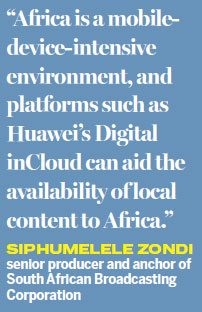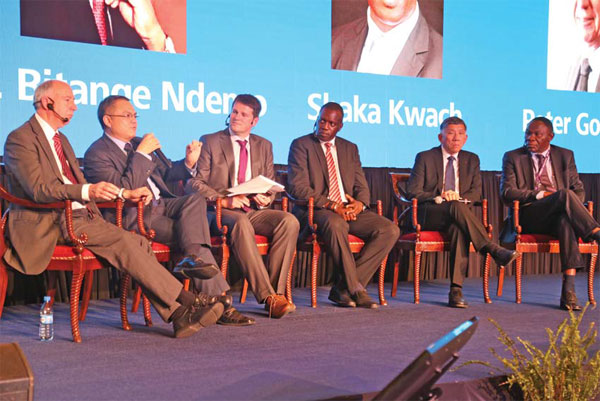New vision for big data: Safe cities
Updated: 2016-11-04 07:22
By Edith Mutethya(China Daily Europe)
|
|||||||||
Huawei plays key role in creating technology to strengthen public security in Kenya
Security and technology experts are calling on African governments to embrace safe-city concepts in an effort to address the increasing incidence of crime and extremism.
Combating crime, according to the experts, has become the hardest activity for police and security organizations, as available video security systems are faced with blind spots, unclear images, difficult video retrieval and data damage or loss.
To solve these challenges, the experts are recommending a safe-city technology solution provided by Huawei Technologies Co, a Chinese multinational IT company headquartered in Shenzhen, Guangdong province.
|
Participants in the Huawei Safe City Africa Summit held in Nairobi, Kenya, on Oct 14. They suggested using a safe-city technology solution provided by Huawei to combat crime and extremism in Africa. Provided to China Daily |
The solution is an integral network of sensors and communication platforms that enable public-safety, law-enforcement and related agencies to access context-specific intelligence for managing real-time events and providing seamless service delivery to the public.
Experts who spoke during the Huawei Safe City Africa Summit in Nairobi on Oct 14 and 15, applauded the country's safe-city project and its three-way partnership between Huawei, Safaricom (Kenya's leading mobile phone operator) and the Ministry of Internal Security.
The first phase of the project, which involved the installation of surveillance cameras in densely populated Nairobi and Mombasa, coincided with a 46 percent drop in crime from 2014 to 2015.
The number of international visitors to Kenya also increased by 14 percent in the first four months of this year to 263,284, compared with 231,038 in 2015, according to Shaka Kwach, special projects head at Safaricom.
Eng Koh Hong, the global chief public safety expert at Huawei, says that while intelligent video surveillance, broadband-trunked radio and computer-aided dispatch are crucial, they are not enough to create a safe city.
"There is a need for a policing cloud to link up the silos of different public safety agencies for better information sharing and user experience," he says.
The one-stop ICT solutions provided by Huawei in the safe-city market are now deployed in more than 100 cities in some 30 countries, and serve more than 400 million people.
Huawei not only offers safety to Kenyan citizens and visitors but also brings beautiful rhythms to the ears of music lovers in South Africa.
On Oct 27, Huawei signed cooperation contracts with global and local music vendors in Johannesburg to accelerate digitalization of African music. At the Huawei Southern Africa Partner Summit held in Johannesburg, Huawei inked contracts with Spice Music, Mtech, CCA and other local music vendors.
Africa has great demand for digital services, like music, games and videos, according to Huawei's analysis. In five years, digital services' year-on-year growth in Kenya will be about 40 percent, the company says. However, there remains a big gap between the growing demand and actual production.
The summit, aimed at creating a sharing platform to promote digital collaboration in Africa, has attracted more than 40 industry partners.

Wilson Feng, president of Huawei's carrier business in the southern Africa region, said at the summit that the company is willing to work hand-in-hand with African partners to create a better industry ecosystem.
"We will leverage our innovative technologies in digital services, and our global resources, to improve African consumers' digital experience and accelerate Africa's digital economy development," Feng said.
Through the cooperation, Huawei's digital business cloud will also help its partners in monetization, which means it's a win-win solution for all parties in the ecosystem, he said.
The cooperation with content providers means Huawei will hold the copyrights of millions of music titles from international and local vendors. This is Huawei's first breakthrough into the global music space.
Huawei will then be able to provide music to telecom operators in South Africa, such as Vodacom, MTN, Cell C, etc, which offer music to end users through their music apps.
The summit also showed off Huawei's efforts to leverage its Digital inCloud, a software platform, to integrate content across music, video, gaming and other digital service genres.
Siphumelele Zondi, senior producer and anchor of South African Broadcasting Corporation, said there would be a great need for artists in southern Africa to venture into the digital space.
Often local content is in demand but not available on digital platforms, which then promotes piracy, he said.
"Africa is a mobile-device-intensive environment, and platforms such as Huawei's Digital inCloud can aid the availability of local content to Africa," Zondi said.
Huawei, although a nonpublic company and not on the list, spent 59.6 billion yuan ($8.8 billion; 7.9 billion euros; 7.14 billion) on R&D in 2015, making it the highest spender in China, according to the 2016 Global Innovation 1000 Study report, released on Wednesday by PricewaterhouseCoopers.
Xinhua contributed to this story.
edithmutethya@chinadaily.com.cn
( China Daily European Weekly 11/04/2016 page7)
Today's Top News
Li promotes SCO bank, free trade
High Court: Parliament must vote before Brexit
Court to instruct how to trigger formal EU exit
Premier emphasizes fight against terror
Italian authorities vow to rebuild earthquake-hit areas
Li arrives in Kyrgyzstan for visit, SCO meeting
Xi affirms one-China policy
France to begin moving migrant minors from Calais
Hot Topics
Lunar probe , China growth forecasts, Emission rules get tougher, China seen through 'colored lens', International board,
Editor's Picks

|

|

|

|

|

|








